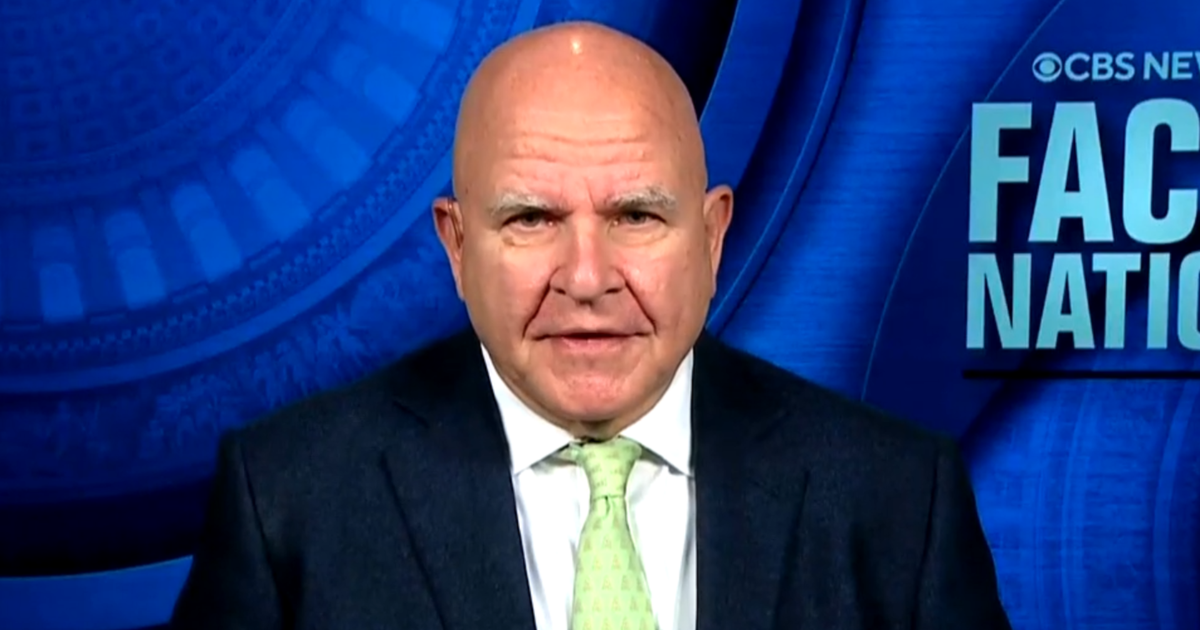CBS News
Cancer patients face frightening delays in treatment approvals

Marine Corps veteran Ron Winters clearly recalls his doctor’s sobering assessment of his bladder cancer diagnosis in August 2022.
“This is bad,” the 66-year-old Durant, Oklahoma, resident remembered his urologist saying. Winters braced for the fight of his life.
Little did he anticipate, however, that he wouldn’t be waging war only against cancer. He also was up against the Department of Veterans Affairs, which Winters blames for dragging its feet and setting up obstacles that have delayed his treatments.
Winters didn’t undergo cancer treatment at a VA facility. Instead, he sought care from a specialist through the Veterans Health Administration’s Community Care Program, established in 2018 to enhance veterans’ choices and reduce their wait times. But he said the prior authorization process was a prolonged nightmare.
“For them to take weeks — up to months — to provide an authorization is ridiculous,” Winters said. “It doesn’t matter if it’s cancer or not.”
Desiree Rios for KFF Health News
After his initial diagnosis, Winters said, he waited four weeks for the VA to approve the procedure that allowed his urologic oncologist at the University of Texas Southwestern Medical Center in Dallas to remove some of the cancer. Then, when he finished chemotherapy in March, he was forced to wait another month while the VA considered approving surgery to remove his bladder. Even routine imaging scans that Winters needs every 90 days to track progress require preapproval.
In a written response, VA press secretary Terrence Hayes acknowledged that a “delay in care is never acceptable.” After KFF Health News inquired about Winters’ case, the VA began working with him to get his ongoing care authorized.
“We will also urgently review this matter and take steps to ensure that it does not happen again,” Hayes told KFF Health News.
Prior authorization isn’t unique to the VA. Most private and federal health insurance programs require patients to secure preapprovals for certain treatments, tests, or prescription medications. The process is intended to reduce spending and avoid unnecessary, ineffective, or duplicative care, although the degree to which companies and agencies set these rules varies.
Insurers argue prior authorization makes the U.S. health care system more efficient by cutting waste — theoretically a win for patients who may be harmed by excessive or futile treatment. But critics say prior authorization has become a tool that insurers use to restrict or delay expensive care. It’s an especially alarming issue for people diagnosed with cancer, for whom prompt treatment can mean the difference between life and death.
“I’m interested in value and affordability,” said Fumiko Chino, a member of the Affordability Working Group for the Memorial Sloan Kettering Cancer Center. But the way prior authorization is used now allows insurers to implement “denial by delay,” she said.
Cancer is one of the most expensive categories of disease to treat in the U.S., according to the Centers for Disease Control and Prevention. And, in 2019, patients spent more than $16 billion out-of-pocket on their cancer treatment, a report by the National Cancer Institute found.
To make matters worse, many cancer patients have had oncology care delayed because of prior authorization hurdles, with some facing delays of more than two weeks, according to research Chino and colleagues published in JAMA in October. Another recent study found that major insurers issued “unnecessary” initial denials in response to imaging requests, most often in endocrine and gastrointestinal cancer cases.
The federal government is weighing new rules designed to improve prior authorization for millions of people covered by Medicare, Medicaid, and federal marketplace plans. The reforms, if implemented, would shorten the period insurers are permitted to consider prior authorization requests and would also require companies to provide more information when they issue a denial.
In the meantime, patients — many of whom are facing the worst diagnosis of their lives — must navigate a system marked by roadblocks, red tape, and appeals.
“This is cruel and unusual,” said Chino, a radiation oncologist. A two-week delay could be deadly, and that it continues to happen is “unconscionable,” she said.
Chino’s research has also shown that prior authorization is directly related to increased anxiety among cancer patients, eroding their trust in the health care system and wasting both the provider’s and the patient’s time.
Leslie Fisk, 62, of New Smyrna Beach, Florida, was diagnosed in 2021 with lung and brain cancer. After seven rounds of chemotherapy last year, her insurance company denied radiation treatment recommended by her doctors, deeming it medically unnecessary.
“I remember losing my mind. I need this radiation for my lungs,” Fisk said. After fighting Florida Health Care Plans’ denial “tooth and nail,” Fisk said, the insurance company relented. The insurer did not respond to requests for comment.
Fisk called the whole process “horribly traumatic.”
“You have to navigate the most complicated system on the planet,” she said. “If you’re just sitting there waiting for them to take care of you, they won’t.”
A new KFF report found that patients who are covered by Medicaid appear to be particularly impacted by prior authorization, regardless of their health concerns. About 1 in 5 adults on Medicaid reported that their insurer had denied or delayed prior approval for a treatment, service, visit, or drug — double the rate of adults with Medicare.
“Consumers with prior authorization problems tend to face other insurance problems,” such as trouble finding an in-network provider or reaching the limit on covered services, the report noted. They are also “far more likely to experience serious health and financial consequences compared to people whose problems did not involve prior authorization.”
In some cases, patients are pushing back.
In November, USA Today reported that Cigna admitted to making an error when it denied coverage to a 47-year-old Tennessee woman as she prepared to undergo a double-lung transplant to treat lung cancer. In Michigan, a former health insurance executive told ProPublica that the company had “crossed the line” in denying treatment for a man with lymphoma. And Blue Cross and Blue Shield of Louisiana “met its match” when the company denied a Texas trial lawyer’s cancer treatment, ProPublica reported in November.
Countless others have turned to social media to shame their health insurance companies into approving prior authorization requests. Legislation has been introduced in at least 30 states — from California to North Carolina — to address the problem.
Back in Oklahoma, Ron Winters is still fighting. According to his wife, Teresa, the surgeon said if Ron could have undergone his operation sooner, they might have avoided removing his bladder.
In many ways, his story echoes the national VA scandal from nearly a decade ago, in which veterans across the country were languishing — some even dying — as they waited for care.
In 2014, for example, CNN reported on veteran Thomas Breen, who was kept waiting for months to be seen by a doctor at the VA in Phoenix. He died of stage 4 bladder cancer before the appointment was scheduled.
Winters’ cancer has spread to his lungs. His diagnosis has advanced to stage 4.
“Really, nothing has changed,” Teresa Winters said. “The VA’s processes are still broken.”
Do you have an experience with prior authorization you’d like to share? Click here to tell your story.
KFF Health News, formerly known as Kaiser Health News, is a national newsroom that produces in-depth journalism about health issues and is one of the core operating programs at KFF — the independent source for health policy research, polling, and journalism.
CBS News
Former Israeli hostages released in truce 1 year ago call for action to release those still held

Former Israeli hostages who were freed from Hamas captivity during a week-long humanitarian pause in fighting exactly one year ago Sunday called for immediate action to secure a deal for the release of those still held.
The only truce in the ongoing Israel-Hamas war on Nov. 24, 2023 – fewer than two months after fighting began – led to the release of 80 Israelis held by militants in Gaza. They were freed in exchange for 240 Palestinians detained in Israeli jails.
Repeated efforts since then by mediators from Qatar, Egypt and the United States to secure another truce and hostage release have failed. Qatar early this month said it was suspending its mediation role until the warring sides show “seriousness.”
Mostafa Alkharouf/Anadolu via Getty Images
Gabriella Leimberg was kidnapped during the Oct. 7, 2023, Hamas attack and was released along with her daughter, Mia, and sister Clara.
“For 53 days, the one thing that kept me going is that we, the people of Israel, the Jewish people, sanctify life — we don’t leave anyone behind,” she said.
Leimberg added: “Everything has already been said and now action is required. We don’t have any more time.”
Around 100 hostages are still in Gaza, and at least a third are believed to be dead.
“I survived and I was fortunate to get my entire family back,” Leimberg said. “I want and demand this for all the families of the hostages.”
Hamas wants Israel to end the war and withdraw all troops from Gaza. Israel has offered only to pause its offensive.
The Palestinian death toll from the war surpassed 44,000 this week, according to Gaza’s Health Ministry, which does not distinguish between civilians and combatants in its count.
Maya Alleruzzo / AP
Danielle Aloni, who was kidnapped with her five-year-old daughter, Emelia, and freed after 49 days, spoke at the ceremony of the “increasing danger” those still being held face every day.
She said those still in captivity “suffer physical, sexual, and psychological abuse, their identity and dignity crushed anew each day”.
“It took the Israeli government about two months to secure a deal for me and 80 other Israeli hostages. Why is it taking over a year to reach another deal to free them from this hell?” asked Aloni, whose brother-in-law, David Cunio, and his brother, Ariel Cunio, are still being held.
She emphasized that, even though she and the other hostages gained their freedom a year ago, “we haven’t really left the tunnels,” — referring to Hamas’ underground tunnels where many of the hostages were held.
“The feeling of suffocation, the terrible humidity, the stench — these sensations still envelop us,” Aloni said.
“If people could truly understand what it means to be held in subhuman conditions in tunnels, surrounded by terrorists for 54 days — there’s no way they would allow hostages to remain there for 415 days!” said Raz Ben Ami, who was released in the deal a year ago.
Her husband, Ohad, is still among those being held.
Ben Ami called for a ceasefire to “bring back all the hostages as quickly as possible”.
CBS News
Couple charged for allegedly stealing $1 million from Lululemon in convoluted retail theft scheme

A couple from Connecticut faces charges for allegedly taking part in an intricate retail theft operation targeting the apparel company Lululemon that may have amounted to $1 million worth of stolen items, according to a criminal complaint.
The couple, Jadion Anthony Richards, 44, and Akwele Nickeisha Lawes-Richards, 45, were arrested Nov. 14 in Woodbury, Minnesota, a suburb of Minneapolis-St. Paul. Richards and Lawes-Richards have been charged with one count each of organized retail theft, which is a felony, the Ramsey County Attorney’s Office said. They are from Danbury, Connecticut.
The alleged operation impacted Lululemon stores in multiple states, including Minnesota.
“Because of the outstanding work of the Roseville Police investigators — including their new Retail Crime Unit — as well as other law enforcement agencies, these individuals accused of this massive retail theft operation have been caught,” a spokesperson for the attorney’s office said in a statement on Nov. 18. “We will do everything in our power to hold these defendants accountable and continue to work with our law enforcement partners and retail merchants to put a stop to retail theft in our community.”
Both Richards and Lawes-Richards have posted bond as of Sunday and agreed to the terms of a court-ordered conditional release, according to the county attorney. For Richards, the court had set bail at $100,000 with conditional release, including weekly check-ins, or $600,000 with unconditional release. For Lawes-Richards, bail was set at $30,000 with conditional release and weekly check-ins or $200,000 with unconditional release. They are scheduled to appear again in court Dec. 16.
Prosecutors had asked for $1 million bond to be placed on each half of the couple, the attorney’s office said.
Richards and Lawes-Richards are accused by authorities of orchestrating a convoluted retail theft scheme that dates back to at least September. Their joint arrests came one day after the couple allegedly set off store alarms while trying to leave a Lululemon in Roseville, Minnesota, and an organized retail crime investigator, identified in charging documents by the initials R.P., recognized them.
The couple were allowed to leave the Roseville store. But the investigator later told an officer who responded to the incident that Richards and Lawes-Richards were seasoned shoplifters, who apparently stole close to $5,000 worth of Lululemon items just that day and were potentially “responsible for hundreds of thousands of dollars in loss to the store across the country,” according to the complaint. That number was eventually estimated by an investigator for the brand to be even higher, with the criminal complaint placing it at as much as $1 million.
Richards and Lawes-Richards allegedly involved other individuals in their shoplifting pursuits, but none were identified by name in the complaint. Authorities said they were able to successfully pull off the thefts by distracting store employees and later committing fraudulent returns with the stolen items at different Lululemon stores.
“Between October 29, 2024 and October 30, 2024, RP documented eight theft incidents in Colorado involving Richards and Lawes-Richards and an unidentified woman,” authorities wrote in the complaint, describing an example of how the operation would allegedly unfold.
“The group worked together using specific organized retail crime tactics such as blocking and distraction of associates to commit large thefts,” the complaint said. “They selected coats and jackets and held them up as if they were looking at them in a manner that blocked the view of staff and other guests while they selected and concealed items. They removed security sensors using a tool of some sort at multiple stores.”
CBS News contacted Lululemon for comment but did not receive an immediate reply.
CBS News
Former Trump national security adviser says next couple months are “really critical” for Ukraine

Washington — Lt. Gen. H.R. McMaster, a former national security adviser to Donald Trump, said Sunday that the upcoming months will be “really critical” in determining the “next phase” of the war in Ukraine as the president-elect is expected to work to force a negotiated settlement when he enters office.
McMaster, a CBS News contributor, said on “Face the Nation with Margaret Brennan” that Russia and Ukraine are both incentivized to make “as many gains on the battlefield as they can before the new Trump administration comes in” as the two countries seek leverage in negotiations.
With an eye toward strengthening Ukraine’s standing before President-elect Donald Trump returns to office in the new year, the Biden administration agreed in recent days to provide anti-personnel land mines for use, while lifting restrictions on Ukraine’s use of U.S.-made longer range missiles to strike within Russian territory. The moves come as Ukraine marked more than 1,000 days since Russia’s invasion in February 2022.
Meanwhile, many of Trump’s key selection for top posts in his administration — Rep. Mike Waltz for national security adviser and Sens. Marco Rubio for secretary of state and JD Vance for Vice President — haven’t been supportive of providing continued assistance to Ukraine, or have advocated for a negotiated end to the war.
CBS News
McMaster said the dynamic is “a real problem” and delivers a “psychological blow to the Ukrainians.”
“Ukrainians are struggling to generate the manpower that they need and to sustain their defensive efforts, and it’s important that they get the weapons they need and the training that they need, but also they have to have the confidence that they can prevail,” he said. “And any sort of messages that we might reduce our aid are quite damaging to them from a moral perspective.”
McMaster said he’s hopeful that Trump’s picks, and the president-elect himself, will “begin to see the quite obvious connections between the war in Ukraine and this axis of aggressors that are doing everything they can to tear down the existing international order.” He cited the North Korean soldiers fighting on European soil in the first major war in Europe since World War II, the efforts China is taking to “sustain Russia’s war-making machine,” and the drones and missiles Iran has provided as part of the broader picture.
“So I think what’s happened is so many people have taken such a myopic view of Ukraine, and they’ve misunderstood Putin’s intentions and how consequential the war is to our interests across the world,” McMaster said.
On Trump’s selections for top national security and defense posts, McMaster stressed the importance of the Senate’s advice and consent role in making sure “the best people are in those positions.”
McMaster outlined that based on his experience, Trump listens to advice and learns from those around him. And he argued that the nominees for director of national intelligence and defense secretary should be asked key questions like how they will “reconcile peace through strength,” and what they think “motivates, drives and constrains” Russian President Vladimir Putin.
Trump has tapped former Rep. Tulsi Gabbard to be director of national intelligence, who has been criticized for her views on Russia and other U.S. adversaries. McMaster said Sunday that Gabbard has a “fundamental misunderstanding” about what motivates Putin.
More broadly, McMaster said he “can’t understand” the Republicans who “tend to parrot Vladimir Putin’s talking points,” saying “they’ve got to disabuse themselves of this strange affection for Vladimir Putin.”
Meanwhile, when asked about Trump’s recent selection of Sebastian Gorka as senior director for counterterrorism and deputy assistant to the president, McMaster said he doesn’t think Gorka is a good person to advise the president-elect on national security. But he noted that “the president, others who are working with him, will probably determine that pretty quickly.”













